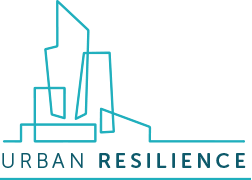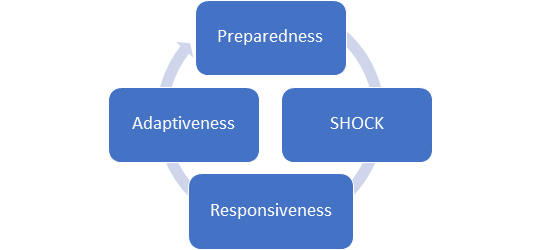Resilience is often described as a series of stages. In practice, policy-makers recognise four stages in a resilience-cycle. However, the dynamic nature of resilience means that these stages may overlap as an economy experiences multiple shocks over time.
Typically, resilience is considered as an outcome following a shock but, in practice, resilience has a more dynamic character. Often using phrases such as ‘panarchy’, writers describe economic (or natural) systems as typically experiencing four ‘adaptive’ phases when responding to a shock. First there is a phase of rapid exploitation, during which strong growth occurs. This is followed by a period of consolidation or conservation where a more stable situation exists. The advent of a shock leads to a release of energy, manifested in some form of decline or downturn, following which the system reorganises around surviving elements, leading to a new phase of exploitation. Writers have amended this basic model to illustrate the interaction of interlocking ‘fast’ and ‘slow’ cycles. Situations where small, fast cycles overwhelm a wider system are described as revolts, in contrast to circumstances where system ‘memory’ shapes the pattern of reorganisation in a process described as remembering.
In our research actors identified an alternative conception of this dynamic model of resilience (Figure 1). This stresses the interconnectedness of each of the phases.
Figure 1: A stylised model of a resilience ‘cycle’
Following a shock, resilience is often measured in terms of the ability of an economy to return to the state which existed prior to the shock occurring. This is what gives rise to terms such as ‘bounce back’. This is the phase labelled ‘responsiveness’ in Figure 1. The resilience of an economy may also be affected by the extent to which it is able to adapt to changing circumstances following a shock, what is sometimes referred to as ‘bouncing forward’. In Figure 1 this phase has been labelled ‘adaptiveness’.
The ability of an economy to withstand or respond to a shock though is often determined by the extent to which it was prepared for such an event prior to the shock occurring. The level of preparedness might be deliberately planned for, where a potential shock is foreseen, or might be the outturn of policies and practices which better equip an economy to deal with unanticipated events. In Figure 1 this phase is labelled as ‘preparedness’.
Shocks continuously buffet an economy to a greater or lesser degree. In consequence, the extent to which an economy is prepared for a potential shock in the future, is contingent on the actions that it has taken in response to a previous shock and how it adapts to any changes in circumstance. This element of dependency on past actions is what provides the cyclical and dynamic dimension to the four phases of resilience.
In practice of course, there is often not one single shock, but rather a series of multiple events which have a common root but may have very different manifestations. This suggests that responsiveness is a function not of the ability to respond to a single act but rather to the collective consequences of a series of events. Similarly, as the economy adapts to new circumstances the ability to ‘remember’ lessons from the past can influence the ability to respond in the future (preparedness). In the case of the city of Cork in South West Ireland for example, the memory of massive factory shutdowns in the early 1980s continues to shape policy 30 years later. Municipal politicians openly acknowledged that it was this memory that influenced their approach to developing a more diverse economy that proved less vulnerable to the financial crisis of 2008/09. In contrast, in Western Macedonia in Greece, policies to counter the effects of the closure of major employers led to an increasing reliance on one major industry, increasing the vulnerability of the economy to future shocks, despite short-term effects limiting the adverse effects of the original event.
Crucial to the development of successful policies then is the art of recognising how circumstances have changed, often as a result of the adaptive actions taken in an economy in response to a recent shock, that makes it more (or less) prepared for the uncertain economic shocks of the future.
Dr. Adrian Healy is a UKRI Future Leaders Fellow. All views expressed are my own. The research on which this piece is based was undertaken in collaboration with Prof. Gillian Bristow.

